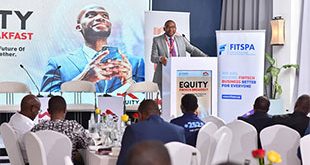
Pan-African telecommunications service provider, SEACOM, unveiled its regional expansion strategy for the Ugandan and East African markets.
Kampala, Uganda | THE INDEPENDENT | The launch held in Kampala on March 10 was attended by a cross-section of clients, business partners, staff, representatives of key government ministries and parastatals in Uganda, and top SEACOM executives from the region and beyond.
SEACOM Group CEO, Oliver Fortuin, flanked by SECOM Managing Director for East Africa, Tejpal Bedi and SEACOM Uganda account managers, Dennis Okiror and Rodney Mujuzi said the regional expansion strategy has received a huge boost with the acquisition of Africell’s fibre infrastructure assets to propel their service offering in Uganda.
Bedi said the regional expansion strategy is a testament to SEACOM’s commitment to provide competitive end-to-end connectivity and information communication technology solutions across the region.
He said, “East Africa and Uganda have been an important market for SEACOM ever since we first arrived on the shores of Mombasa in 2009. By officially establishing ourselves in Uganda through proprietary facilities and resources, we are prioritising widespread connectivity and opening up opportunities to work with businesses in search of quality communication services.”
Fortuin said the regional expansion strategy would see the firm make significant strides in offering added value to their clients by improving on their current physical network.
“As part of the regional expansion, we will increase our fibre footprint within the Ugandan capital city of Kampala and surrounding towns,” he said, adding, “The acquisition goes hand in hand with our five-year strategy into expanding operations in the region.”
SEACOM has provided wholesale solutions to Uganda since its inception in 2009 and corporate solutions since 2018. It enjoys a large footprint in Uganda’s financial services sector and works with government and non-governmental organisations, including those in the education, technology and hospitality sectors.
Although small businesses dominate, Uganda is home to a thriving private-sector with thousands of medium to large companies across Kampala and the central region.
There is also a growing internet penetration rate with competitive connectivity prices compared to other countries in the area. The government of Uganda has promised to work towards reducing internet costs to support businesses engaged in the technology space and related services.
Speaking at the same event, Joseph Kiggundu, the Uganda Investment Authority director in charge of the One Stop Center said, SEACOM has taken gigantic strides since it launched Africa’s first broadband submarine cable system along the continent’s Eastern and Southern coasts in 2009 to this day.
“You have made a very wise decision, and you will not regret it,” Kiggundu said. Uganda and the East African region are growing steadily in population and GDP. He said, Uganda has one of the youngest populations globally, with over 70% aged 35 years and below – the youth would love to do learning, research, studies, gaming and entertainment using internet services.
The other favourable factors include, Uganda being the most open country in the region for Foreign Direct Investment, having highly competitive labour costs, strong natural resource base and is friendly, an entrepreneurial nation.
Godfrey Kabbyanga, the state minister for national guidance under the ministry of ICT and national guidance said, over the years, the government has made strategic investments in the various sectors in a manner that will improve the country’s global ICT indices for purposes of making investors go about their business and attain value out of it.
“This is why the Digital Uganda Vision for 2040 aims to empower its citizens to strive to achieve the goals of universal inclusion, sustainable development, economic progress and poverty eradication through digital innovation combining initiatives across multiple sectors,” Kabbyanga said.
He added that the government has also designed the National ICT Initiatives Support Programme to facilitate the creation of an ICT innovation ecosystem and marketplace for Ugandan innovative digital products.
Kabbyanga said, the expansion of SEACOM’s fibre into the Ugandan market comes when the
government and the population need it the most.
“Over the last two years, the COVID-19 pandemic provided a period of crisis that unveiled the need to expand the digital network in Uganda to enable the services to continue uninterrupted. The pandemic also highlighted the importance of technology and the internet for remote working, and some halted critical services like education.”
****
 The Independent Uganda: You get the Truth we Pay the Price
The Independent Uganda: You get the Truth we Pay the Price



